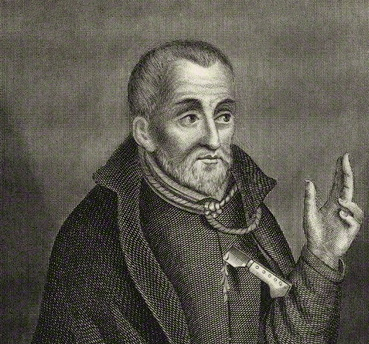In 1566, Queen Elizabeth I visited Oxford University searching for young men to become priests in the Church of England. Elizabeth had forbidden the practice of the Catholic faith and herded all her subjects into the Anglican church. Catholics who failed to do so were not only forced to pay huge fines, they were sometimes thrown in jail, tortured and even killed.
Chosen to give a welcoming speech to the queen at Oxford was Edmund Campion, a brilliant scholar, teacher and playwright with a devoted following of young students who dubbed themselves “Campionists.” He was known at the time as England’s greatest orator. Campion’s words so charmed the queen she brought him to serve at court, where he eventually became a deacon of the Church of England.
And then things turned. As a deacon he began an in-depth study of the church fathers. Their writings were so powerful and convincing that over time he was won over to the Catholic Church. He left the queen’s court, fled to France, converted to the Catholic faith and entered the Jesuit novitiate in Prague, Bohemia.
Several years later, Campion was sent by the Jesuits back to England. His mission was to serve the remaining loyal Catholics and one by one reclaim England for the church. As he put it, in a document that became famous throughout England as “Campion’s brag,” he would “preache the gospel, minister the sacraments, instruct the simple, reforme sinners…in brief to crie alarm spiritual against foul vice and proud ignorance, wherewith many of my dear countrymen are abused.”
Campion became the archetype of the radical underground priest, sometimes literally: on the run, hidden under disguises, changing names, hiding in “priest holes” in the homes of wealthy benefactors. Eventually, he was captured, tried, found guilty of treason and hanged, drawn, quartered. As always happens, his murder by the state made him even more of a hero and succor to the oppressed English Catholic remnant. He was canonized in 1970.
When America Magazine was founded in 1909, the Jesuits at America saw themselves as ministering in a country hostile to the Catholic faith and so chose Campion as their patron.
While it is Campion’s Brag that the saint is best known for, today maybe it is Campion’s turn that can be most relevant for us. His wit, charm and skill took him to great heights, to the very seat of royal power. But then those same gifts led him to a place where, in good conscience, he could not serve the queen. He left his place of power for a different kind of power, one that eventually cost him everything. He didn’t have to abandon his skills, charm, oratory, he just had to fix them on someplace different.
In a time of extreme fear and danger for the people of his country, Edmund Campion took himself from a safe remove and gave them his talents, his courage and his life.








HP customer support provides best solution to our users.It gives 24/7 technical support to our users.http://hpsupportnumber.net/
hp customer support
Great post, Thanks a lot for the kind of perfect topic I have not a lot of information about it but I have got an extra unique info in your unique post.
http://firefoxsupport.com/about-firefox/